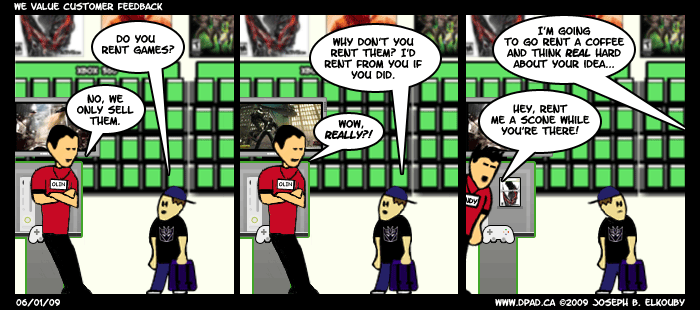<div class=\"postavatar\">![]() </div>
</div>
Renting games is something I’ve started to experiment with recently. I know it’s not a new idea, but it’s something I avoided for a long time because I have a “collector-type” personality. That means I enjoy acquiring stuff even if I’m only going to be using it a few times, but even us collectors have a limit.
Let’s face it, video games are expensive and they depreciate in value worse than a recalled Chrysler. The final straw for me was when I went out to purchase the new Wolverine game — a game that got decent reviews and looks like fun, but doesn’t appear to have a ton of replay value. Maybe it’s a sign of the times, but I felt the asking price of $70 (plus tax) was just too high given the amount of time I expected to be playing with it.
What I usually do in this situation is just skip the game entirely, or wait a few months and pick up a used copy at a lower price. But in doing so I’m either missing out on a good time, or putting off a good time until I no longer care about it. Renting seems like a reasonable compromise. Of course, it’s better for me as a gamer than it is for game publishers. And that got me thinking about where the video game industry is heading.
Consider services like Xbox Live, the Playstation Store, and Nintendo’s Virtual Console. They all allow you to purchase games from a growing online library and download them directly to your console of choice. And then there’s the PSP Go — Sony’s new handheld that ditches UMD discs in favour of flash memory to store digital downloads. All of these services give console manufacturers complete control over the distribution of software, and they leave no room for a third-party used game or rental market.
So now I’m wondering—as I compile my online queue of games I want to rent—how long will it be before all games are distributed digitally? That definitely seems to be the direction the industry is headed in, despite the inherent limitations involved. And that raises another question: what kind of games will publishers be making in a world without discs? That direction seems to favour shorter, simpler titles—the kind that appeal to the much talked-about “casual gamer” (and don’t require hours to download.)
UPDATE: 6/6/09 – Xbox 360 gets full retail games available on-demand
What do you think: can digital downloads co-exist with hard media games? Or are we soon going to be managing our collections according to how much bandwidth our ISPs allow us in a month, and by how much drive space we have? Are we truly destined to give up the right to hoard stacks of game carts and discs, or sell them for pennies on the dollar?
The very thought is almost enough to drive a man to papercraft!
joe at dpad dot ca



 (4 votes, average: 4.25 out of 5)
(4 votes, average: 4.25 out of 5)
I can see that the industry seems to be headed that way but i don’t think it will happen all that quickly. There have been numerous rising concerns for digital downloads of games. Personally i like some games being able to be downloaded but always prefer a hard copy. One of the many problems with digital downloads that has been pointed out recently is what happens when the company you bought the game from goes under? Most digital downloads give you a code of some sort to download again if you lose it and why not, you paid for it. What happens though when the company goes under and the server the game is on no longer exists? Such fears will stave off complete digital distribution for a while, but i fear that as you pointed out our time of hoarding game discs is coming to an end.
Great comic, good to see you back.
-Botched